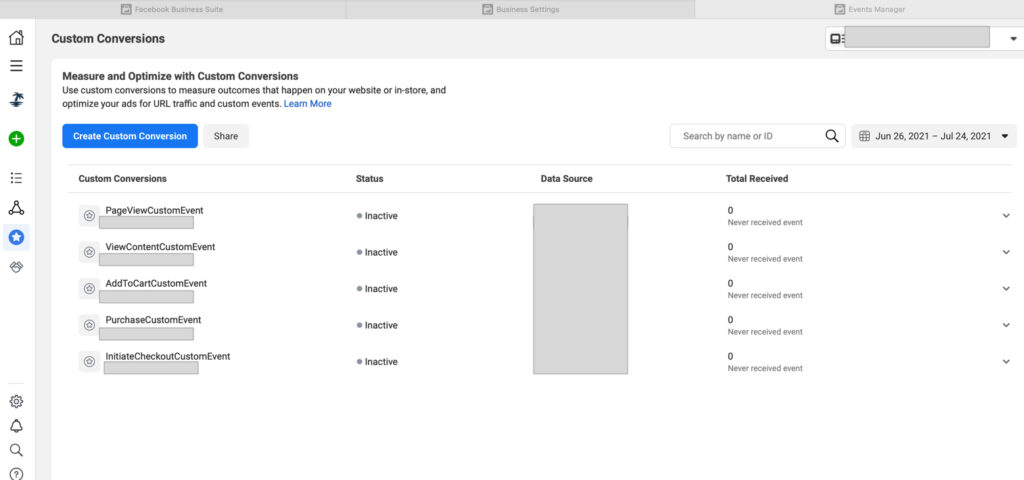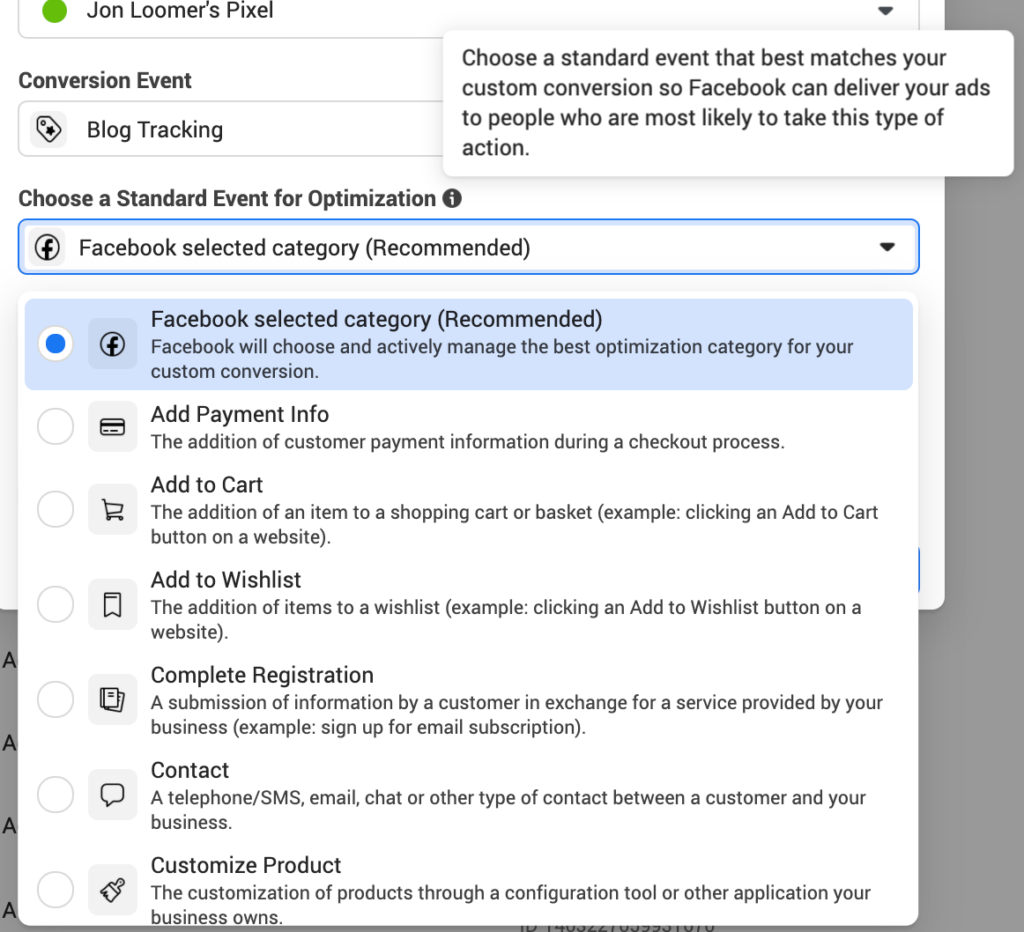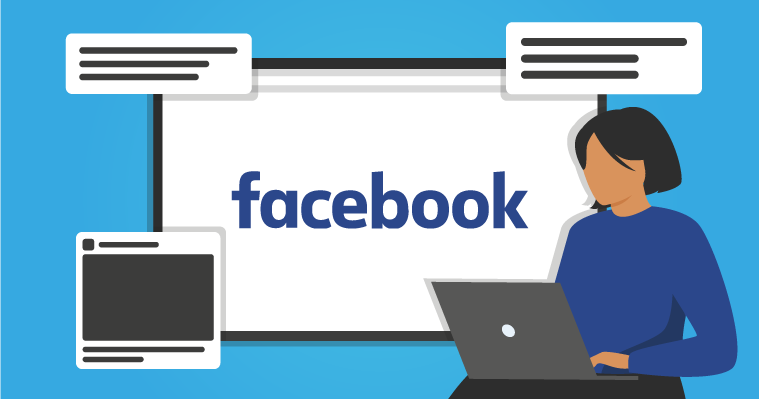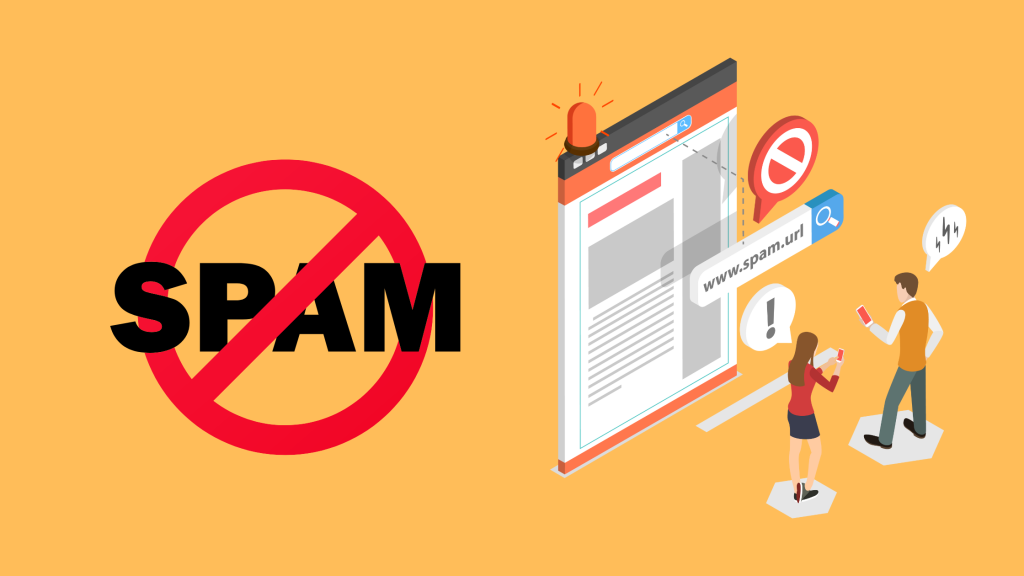Post map
ToggleIf you are the owner of a business website and are using Facebook ads to increase traffic or generate more conversions on your website, understanding the Facebook Pixel is important. So why isn’t the custom conversion working? In this article, Optimal FB will explore Facebook Pixel and how to fix it when Facebook custom conversion not working, helping to improve the effectiveness of your advertising campaigns.
Explanation: What are Facebook Custom Conversions?
With custom conversions, you can set up rules for specific events. When you create these rules, you can measure customer actions in more detail. For example, you can filter out all purchases of women’s shoes over $40. You can then use these custom conversions as effective targeting and reach the users most likely to take the actions you expect.
For example, let’s say an online clothing store wants to track online sales for men’s clothing products priced over $50. They can create a custom conversion event that fires every time someone purchases this product. To do this, they can select “Purchase” as the conversion event and set up the following two rules:
- URL-based rule: The URL where the purchase was made contains the keyword “men”.
- Rules-based on parameters: Products with a value greater than $50.
Once they have received a sufficient amount of data from these custom conversions, they can use them to set effective goals. This means they can show their ads to users most likely to purchase men’s clothing products priced above $50.
Reasons why Facebook custom conversion not working and how to fix them
Some reasons why Facebook custom conversion does not work that you can refer to come up with the best solution are:
Meta Pixels have not been optimized
One of the ways to effectively achieve your goals in Facebook advertising is to use Meta Pixels correctly. Meta Pixel, also known as Facebook Pixel, is an important tool that helps connect Facebook ads with different data sources like websites.
Thanks to Meta Pixel, businesses can track and better understand customer behavior, thereby evaluating the performance of Facebook advertising campaigns in detail. However, if the Meta Pixel is not optimized properly, this can be one of the reasons why your Facebook advertising campaign is not achieving the desired conversions.
To test and improve conversion tracking from Facebook ads, you can use Meta Pixel and perform the following steps:
- Standard events: You can track typical actions like purchases or sign-ups using standard events.
- Custom events: Meta Pixel allows you to set up custom events tailored to your specific business goals.
- Custom conversions: By parsing your site’s referring URLs, you can automatically track your visitors’ conversion actions.
By using these Meta Pixel features properly, you can optimize the performance of your Facebook advertising campaign and achieve your business goals effectively.
The budget does not meet the needs of the campaign
The problem of too low a budget is often one of the common reasons why Facebook advertising campaigns do not achieve expected conversions. A common piece of advice is “it takes money to make money”, and yes, to get the best results, you need to invest a large enough budget in your Facebook Ads campaign. If the budget is limited too low, the ad may run out of budget quickly and fail to generate the expected conversions.
For example, if your budget is too low, your ad will be less visible to audiences who are likely to take your desired action. This can result in the campaign not having enough opportunities to convert. It’s also important to note that your Facebook advertising lifetime budget may result in your budget running out before your conversion opportunities have been optimized at that particular time. When your budget is too low, the cost per conversion from Facebook ads can increase, meaning you’ll have to pay more for each action you expect users to take.
To fix this problem, you first need to make sure your budget is high enough to show your ads to the right target audience and stimulate conversions. Take the time to research Facebook Ads performance metrics and determine the budget needed to achieve your desired goals.

How to use Facebook custom conversions
To use custom conversions to filter events, you’ll need to first set up Meta Pixels and create standard or custom events on your website. To use Facebook custom conversions, you can refer to these specific steps:
- Step 1: First, visit Event Manager on Meta.
- Step 2: Next, click on Custom conversions in the top left menu.
- Step 3: Click the Create custom conversion button.
- Step 4: Enter a name for your custom conversion and add a description if needed.
- Step 5: Select the data source for your custom conversions.
- Step 6: Select the conversion events you want to track.
- Step 7: If you select All URL visits or custom events, you’ll see the option to select standard events to optimize. Keep the option they suggest or choose a category that best describes the conversion event you’re interested in.
- Step 8: Set up rules using URL or event parameters. You can select the parameters that you currently send with the selected event. If you don’t see the parameter you want to select, update your pixel setup or the Conversion API to send the parameter with the event.
- Step 9: You can also click the plus sign (+) if you want to add another rule.
- Step 10: If necessary, you can select the cell to enter the conversion value and enter your value. Only use this field if your custom conversion events don’t already have conversion values. Remember to only use integers and not include any other characters.
- Step 11: Finally, click the Create button to complete the process of creating your custom conversion.

Note that each ad account or business profile is limited to a maximum of 100 custom conversions. However, you can delete unnecessary custom conversions and add new ones as needed.
In the article on Optimal FB, we have listed for you the most accurate detailed information. We hope that the content we share can help you learn about the reasons why Facebook custom conversions do not work and take steps to fix and use Facebook custom conversions successfully. labour.
Contact Info
We provide services facebook dropship ads nationwide, and with a team of experienced and qualified staff who both support advertising and can directly perform Facebook advertising if you need. Contact us via phone number: +84 564 104 104 for detailed advice.
Frequently asked questions
Meta Pixel optimization is an important step to ensure the effectiveness of your Facebook advertising strategy. First, you need to identify the important events you want to track on your website. Then set up and configure Meta Pixel to accurately track those events. Make sure the Pixel is deployed properly on all your pages and activated when necessary. Next, test and update regularly to ensure that your Pixel is working effectively and accurately capturing important data. Finally, use Facebook’s analytics tools to analyze and optimize your Pixel’s performance, thereby improving the effectiveness of your advertising campaigns and increasing conversion rates on your website.
To set up the Facebook Pixel, you can follow these steps:
– Access Facebook Events Manager by logging in to your ad account.
– Select the “Pixel” option from the top left menu.
– Click the “Add Pixel” button and enter a name for your Pixel.
– Copy the generated Pixel code and paste it on your website between tags and let it be loaded when your website is opened.
– Customize your Pixel’s settings by choosing the events you want to track, like page views, purchases, or form fills.
– Once your Pixel has been configured, tap “Finish” to complete the setup process.
The pixel will start collecting data and you can track the performance of your ad campaigns on Facebook.


